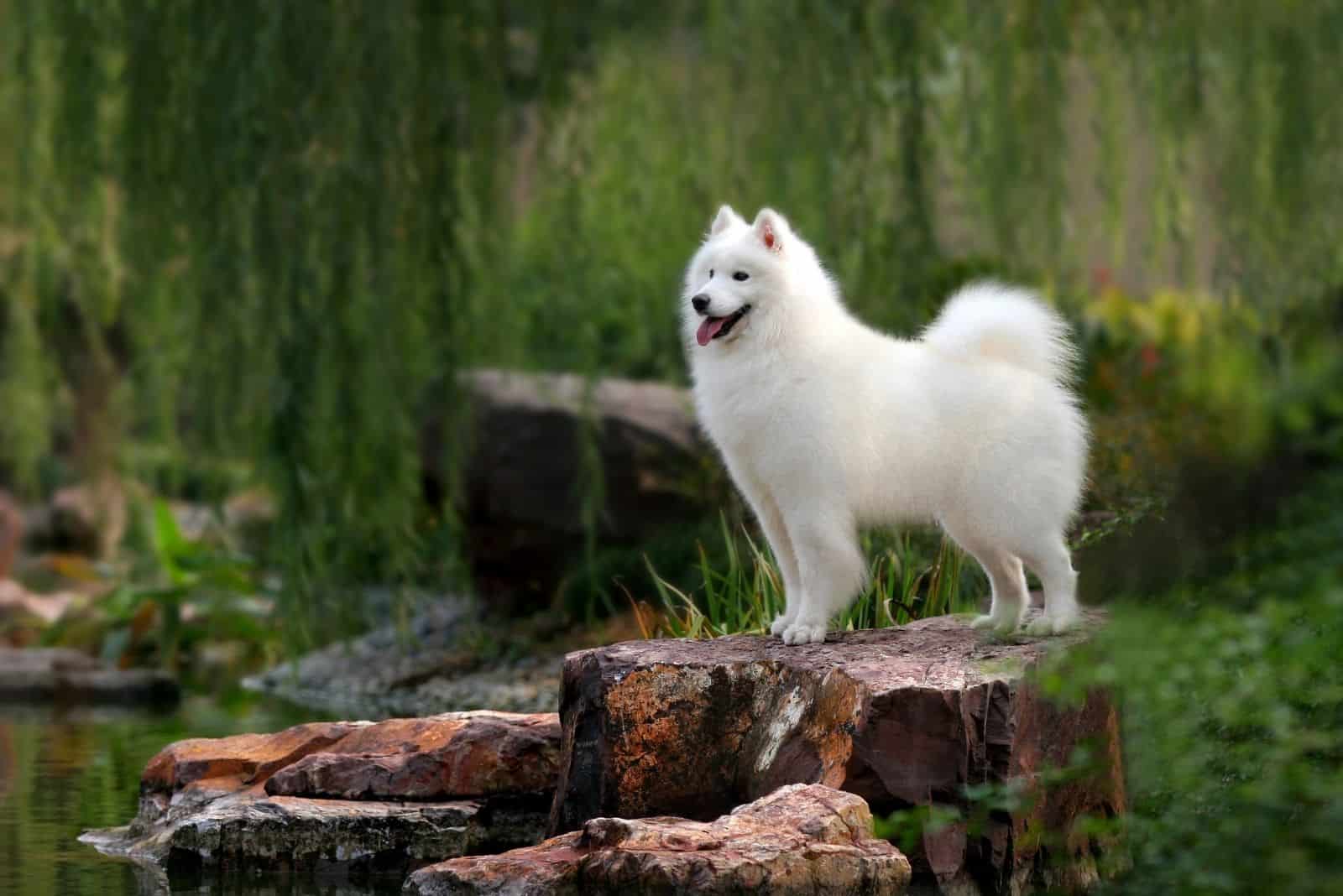It’s a reasonable and sensible question if you are thinking about getting any breed of dog. You want to know that you and your family will be safe.
So, are Samoyeds aggressive? All the evidence seems to suggest that the answer is no!
Check out any blog or website and you’ll find glowing reports of the Samoyed and its super-friendly nature. But, is this really true? Can we just accept this at face value and welcome one of these dogs into our home?
Join us as we take a deep dive into the Samoyed’s character and personality in order to find out what they’re really like.
We’ll begin with some background information.
The Samoyed Dog
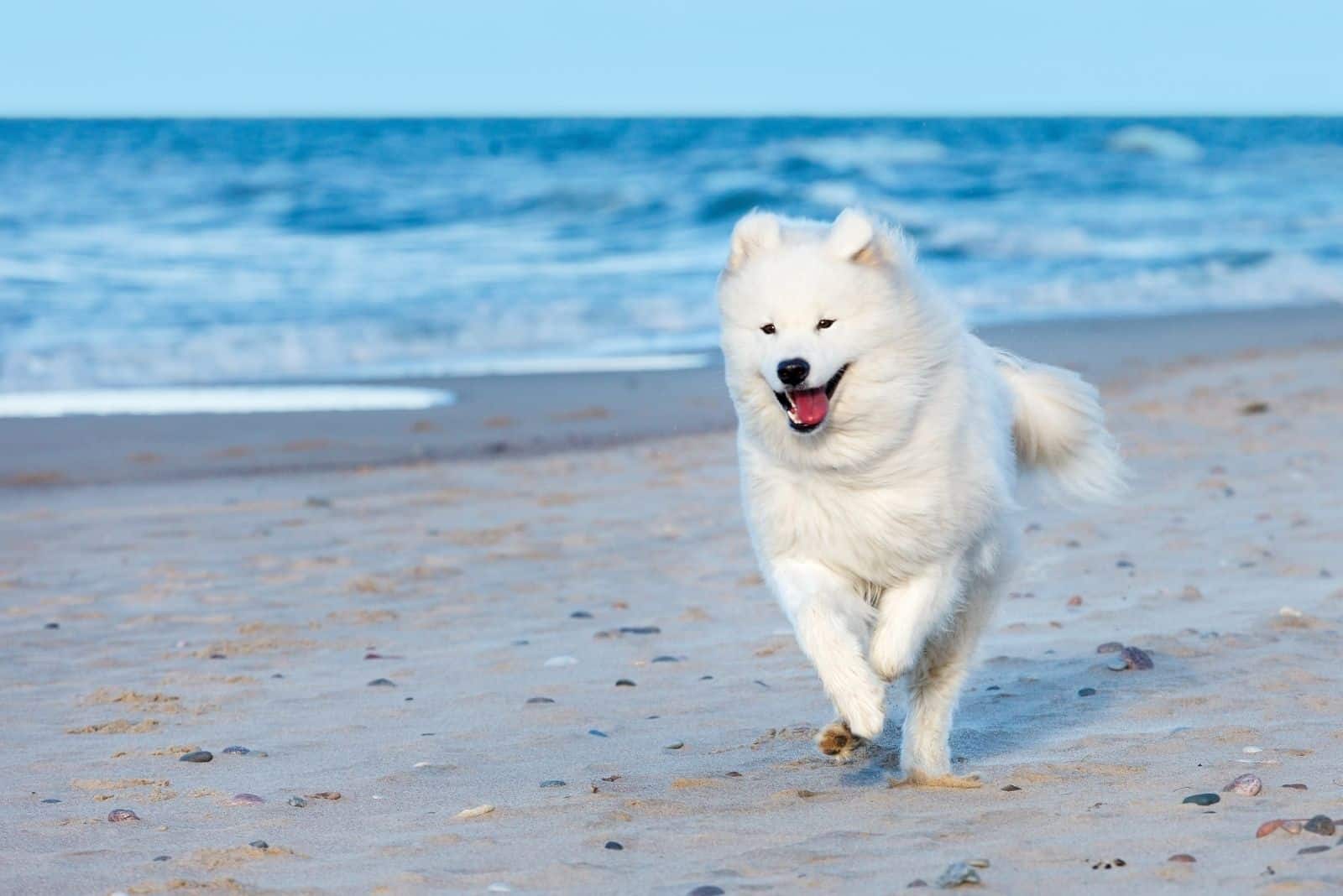
This beautiful white dog takes its name from the Samoyedic people of Siberia. These nomadic tribes were reindeer herders, using Spitz-type* dogs such as the Laika for hunting, herding, and pulling sleds.
Samoyed dogs are descended from the Laika, and were used as working dogs in the same way.
*Spitz comes from the German word for ‘pointed’, which refers to the shape of the ears and muzzle. These are usually companion dogs with thick, white fur, and are mostly from Siberia or the Arctic region.
How Big Are They?
They are classed as a medium-to-large dog:
[table id=66 /]
These figures include the breed standards required by the American Kennel Club (AKC) and the UK Kennel Club.
Your own Samoyed need not necessarily fall inside these ranges, but as long as it is healthy, it shouldn’t be a problem unless you plan to enter them into dog shows.
The Samoyed Coat
The majority of Samoyeds are pure white, although you will occasionally see cream, biscuit, or white and biscuit.
This is a thick, lush, double-coat that takes some looking after! The undercoat is woolly, covering the entire body.
This developed as a means of protection from the harsh Siberian and Arctic climate.
The outer coat consists of straight, coarse hairs that grow through the undercoat. This provides a water-resistant layer that also reflects sunlight. All in all, it’s ideal for keeping these sled dogs warm and dry in the snow and ice.
Oddly enough, it also helps to keep them cool in sunnier climates!
You might wonder how all of this is relevant to our task in answering the question, Are Samoyeds aggressive?
The fact is, to care for a dog, you need to look at the whole package. You need to understand a little of the history of the breed in order to see what traits might be passed along in the genes.
You should also accept that it is your responsibility to make sure they are healthy and happy, and that means feeding them properly and grooming them regularly.
If you understand what kind of coat they have, then you’ll be better prepared. Grooming is a great way of bonding with your dog, and an opportunity to look for any signs of injury or sickness, such as tumors or sore joints.
An aggressive dog will present a problem when you try to do this. Alternatively, an otherwise placid and gentle dog that suddenly shows aggressive behavior could indicate that something is wrong.
But, what do we mean by ‘aggressive behavior’?
What Is Aggressive Behavior In Dogs?
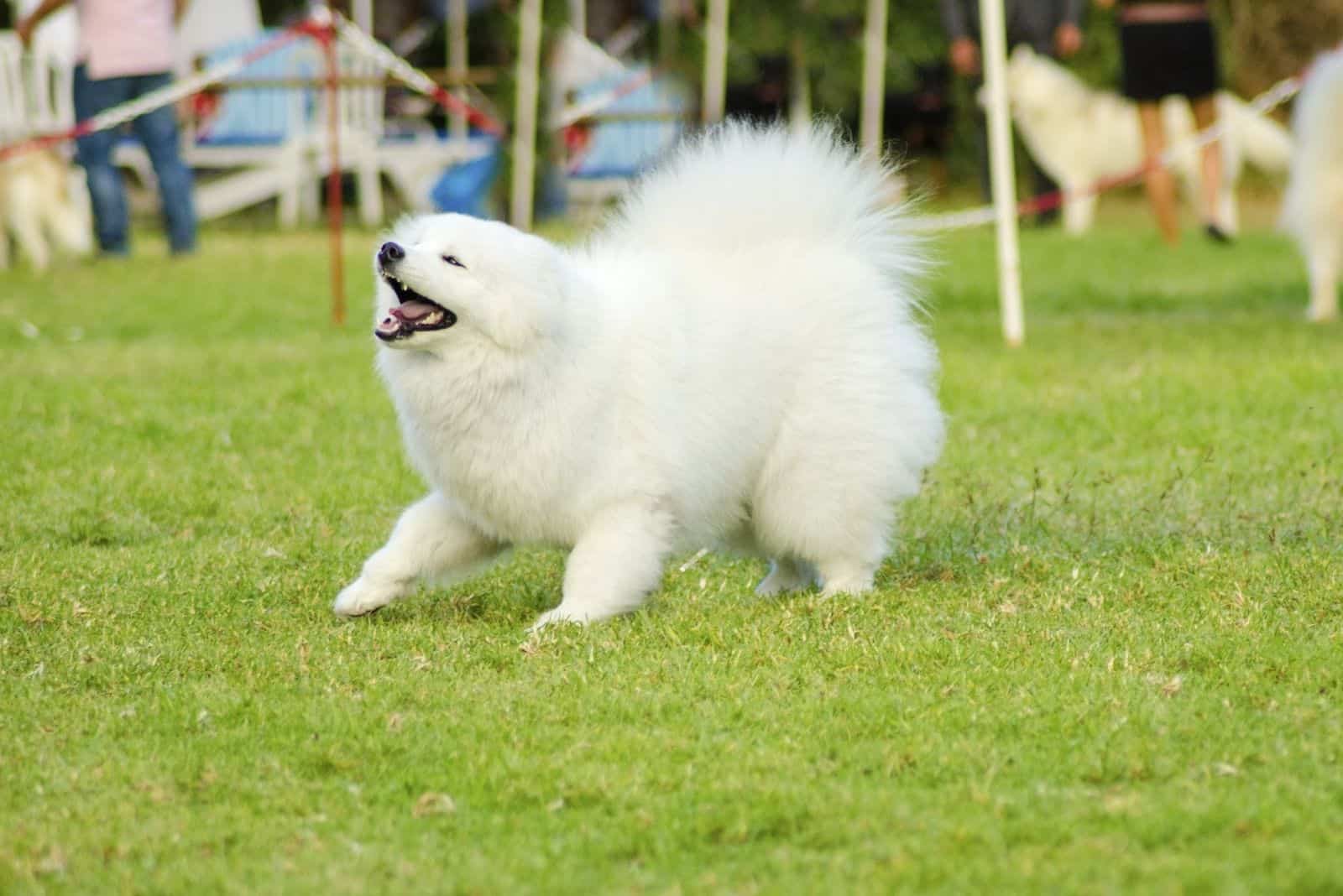
Most of us will have a different definition of this, so it’s pretty hard to give a precise explanation.
Dogs communicate the only way they can – by barking, snarling, growling, and howling. Body language also plays a big part in doggy communication.
Sometimes, when a dog growls, it isn’t being aggressive, it is merely giving a warning. Likewise, with barking, dog owners will quickly learn the different types of barks uttered by their furry companion.
They know the difference between Open the door! You left me in the yard, and Yay! You’re home!, or even Quick, there’s a stranger at the door!
Each sound will be different, though sometimes, this will be subtle. You will learn to distinguish between these sounds, and you should be able to detect any signs of aggression.
But, we still haven’t pinned down what aggressive behavior looks like.
The best answer is that aggression is a relative term. Any dog is capable of aggression in the right (or wrong!) circumstances.
The real difference lies in whether a dog is more or less likely to attack under those conditions.
When the barking, growling, and snarling escalate to biting, then you might safely say you are witnessing aggressive behavior. However, it’s best to take action well before this stage.
Some breeds, rightly or wrongly, have a reputation for being very aggressive. There’s a very strong argument in support of the fact that humans are more to blame for this than the animals themselves. But, that’s another story.
Dog aggression is usually based on fear, pain, anxiety, territorial behavior, sexual behavior, possessiveness, and food guarding.
The level of aggression will depend on the breed and the individual character of the dog in question.
It’s up to us to recognize the signs and deal with each situation. In fact, it’s best to anticipate them and avoid them completely wherever possible.
So, are Samoyeds aggressive? Actually, they have earned a reputation for being exactly the opposite!
They even picked up the nickname Smiling Sammies because of their permanently happy faces, which perfectly match their temperament!
The Samoyed Temperament
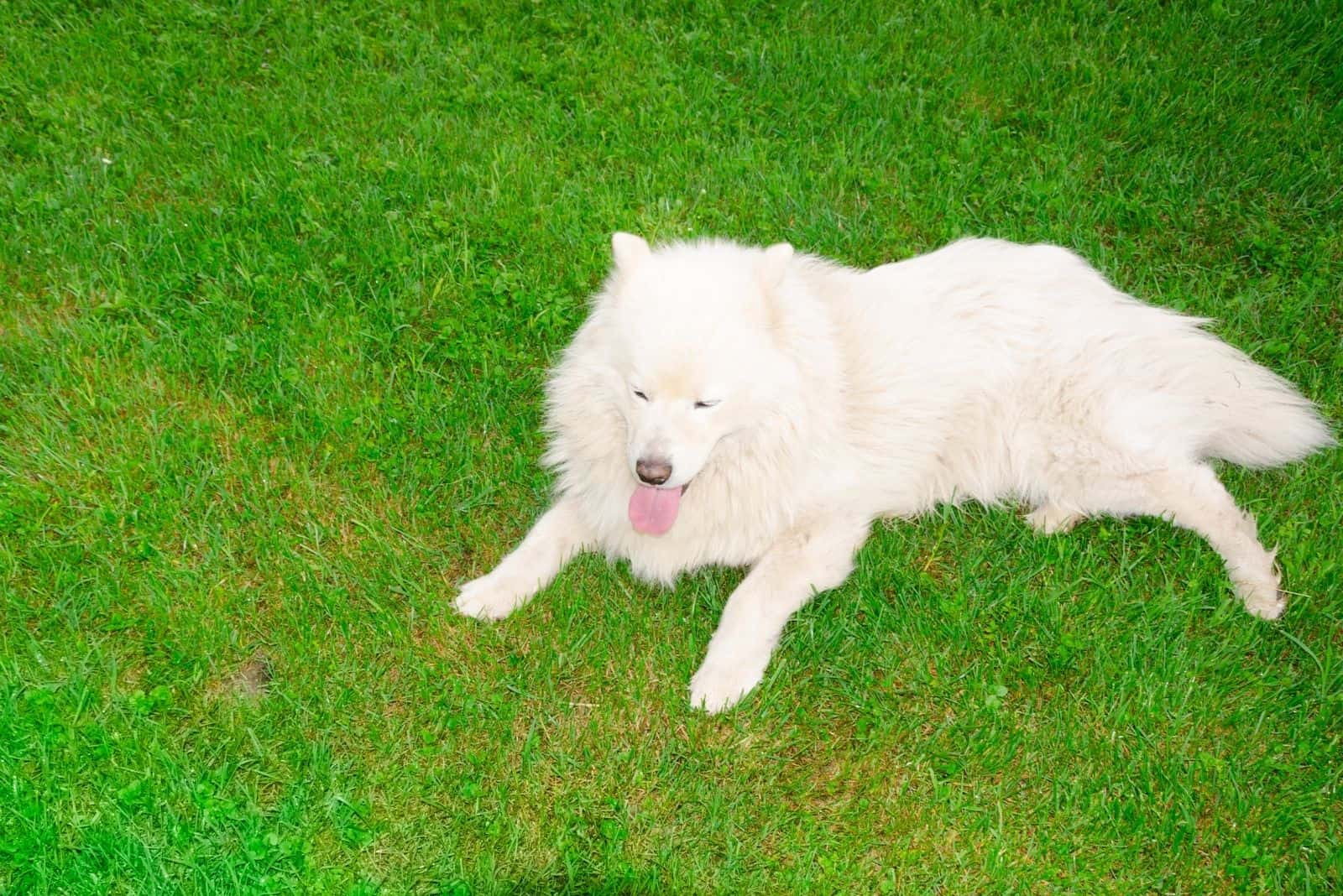
Smart, social, friendly, loving, gentle, humorous, dependable, loyal, good-natured, and high-spirited… these are just a handful of the terms used to describe Samoyeds.
They are very playful to the point of being boisterous, and they thrive on human companionship. They can be independent and even a little mischievous and nosy.
But wait, isn’t this breed closely related to the wolf? Yes, it is! Genetically speaking, they’re almost identical.
However, the Samoyed was originally bred for close contact with humans, often sleeping in tents with their owners to avoid the worst of the snow.
They retain some of the natural wolf-like instincts, but have learned to cohabit with humans.
Breeders have helped over the decades by favoring their companion dog characteristics over their herding or working dog traits.
This has resulted in one of the friendliest dog breeds around.
Are Samoyeds Good Family Dogs?
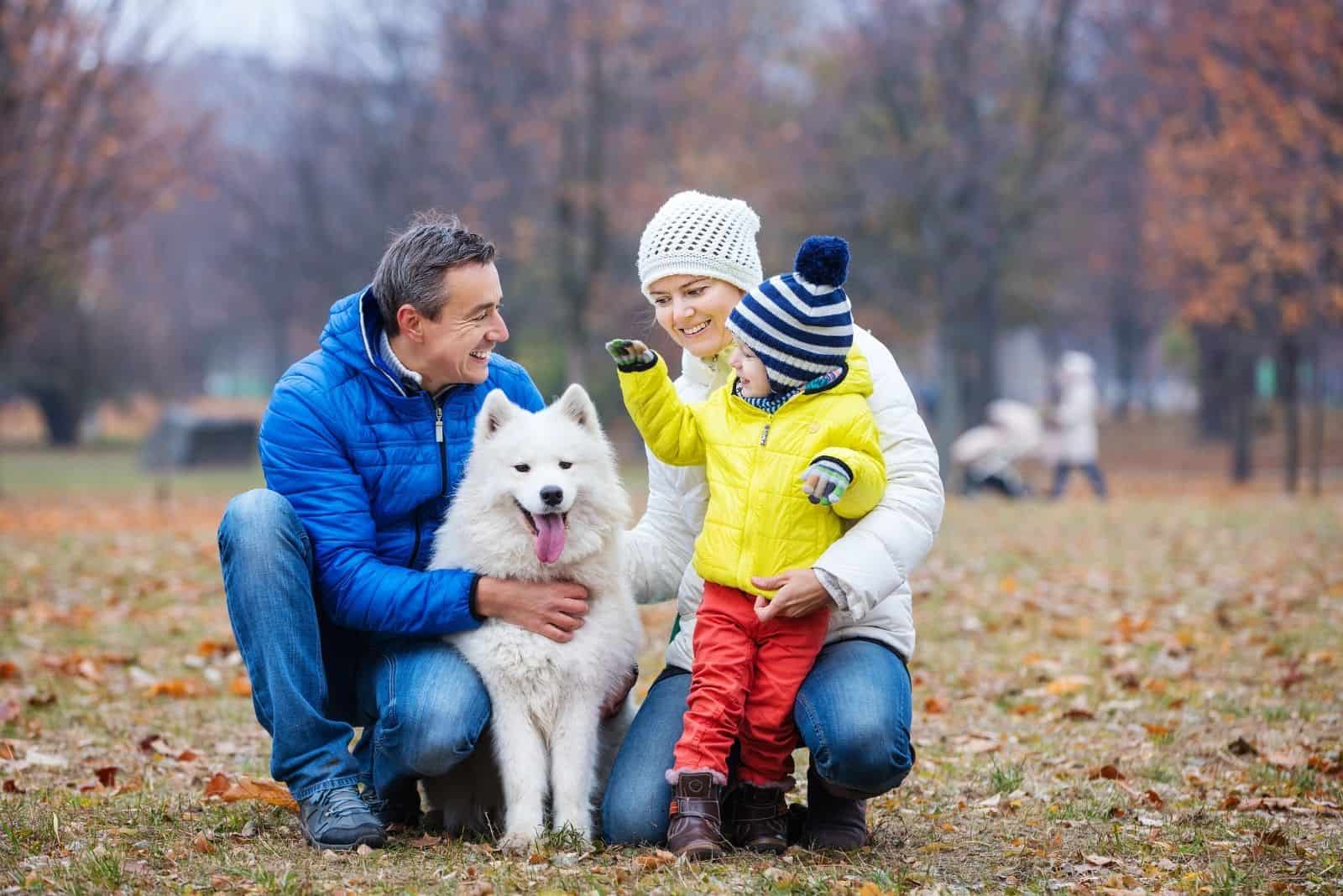
Yes, they are! In fact, there are only a few breeds better suited for the role.
As well as possessing all of the wonderful attributes mentioned above, they are sensitive, too. When people ask, ‘Are Samoyeds aggressive?’ one of the main concerns is whether the dog will be safe around kids.
With the Samoyed, you have no need to worry. They are brilliant with kids of all ages.
Have you ever known a dog to be so sensitive that it treats toddlers more gently than older kids? You may have, but this is a rare trait. The Samoyed will happily do this.
Even so, these qualities should never be taken for granted.
You need to play your part in helping the dog to settle into your home and become part of the family. They will get along with all family members, as well as other pets, but they might form a stronger bond with one individual.
However, they need proper care and attention to ensure that they thrive.
This includes the fact that they should receive obedience training and socialization to help smooth out some of the possible character traits that might cause problems later.
This includes the herding instinct, which might prompt them to round up animals and kids and nip at their heels. Obedience classes will reduce this desire and make them responsive to commands to stop this behavior.
Although they’re intelligent, the Samoyed can be wilful and obstinate at times. It isn’t that they are naughty; just that they’re spirited.
This makes early training even more important unless you want a battle when they are older. For this reason, they are often regarded as not being ideal for first-time dog owners.
There’s a good chance that their history as sled dogs will mean that they take you for a walk rather than the other way round.
They don’t understand that this is annoying and uncomfortable for you. They believe that they are being helpful. Dog training will correct this for you and make walking a more enjoyable experience.
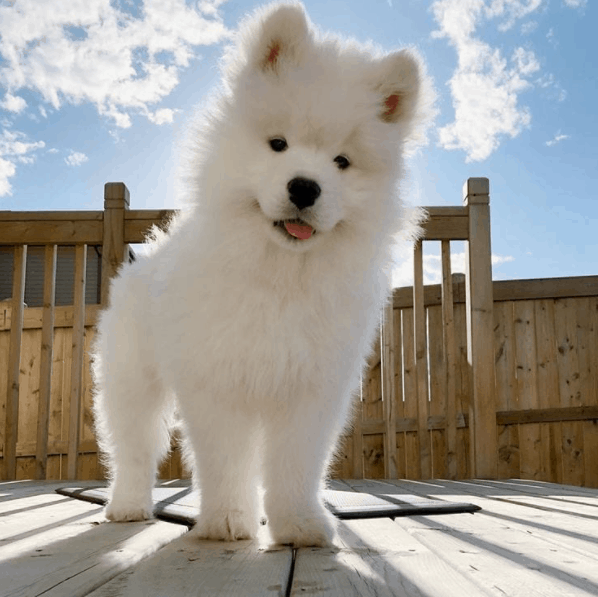
Photo from @dogvibes_only
While we’re on the subject of walking, you’ll need to do quite a bit of this. Samoyeds are very active, high-energy dogs.
Set aside around two hours each day for walking, running, playtime, visiting the dog park – anything to make sure they use up all that energy!
It helps if you have a fairly big backyard, as they’ll love to zoom about there. Never be tempted to tether them, though. They’ll become frustrated and bored.
The same applies if you leave them alone for long periods, especially if they haven’t had the right amount of exercise.
They may resort to destructive behavior, such as digging and chewing, and they will definitely bark.
Barking is one of the rare negative points about Sammies. The Samoyed breed just loves to bark. They do it when they are happy, they do it when they are bored, upset, scared, excited, etc.
The good news is that this problem can be solved through proper training. You should get your Samoyed puppy to a dog trainer as soon as possible to get the best results.
You’re never going to get a dog to stop barking completely. After all, this is part of their nature and a way of communicating.
It would be unfair and unnatural to silence them. What you can do is let them know that barking is not always okay. With the right training, they will know when to stop, and they will listen to you when you tell them to shush!
You will also need to establish a grooming and care routine. That fluffy white coat will take a fair amount of brushing. In fact, daily brushing is recommended to keep it free from loose hair, dirt, and twigs, and leaves.
Please note that you should never clip their hair short or shave it off. This interferes with their ability to regulate their body temperature, and could even prove to be fatal. They will also be at serious risk of sunburn and heatstroke.
Finally, you should commit to feeding them good-quality dog food only. Apart from high-quality kibble, you can feed your Samoyed certain human foods. Foods such as basil, jicama, jasmine rice, sauerkraut, and cilantro can be a good source of vitamins, minerals, and antioxidants.
If you give your Sammie all the care and love it deserves, then there’s no reason why it should show anything but the friendly, playful, and loving nature it is famous for.
Can A Samoyed Be A Guard Dog?
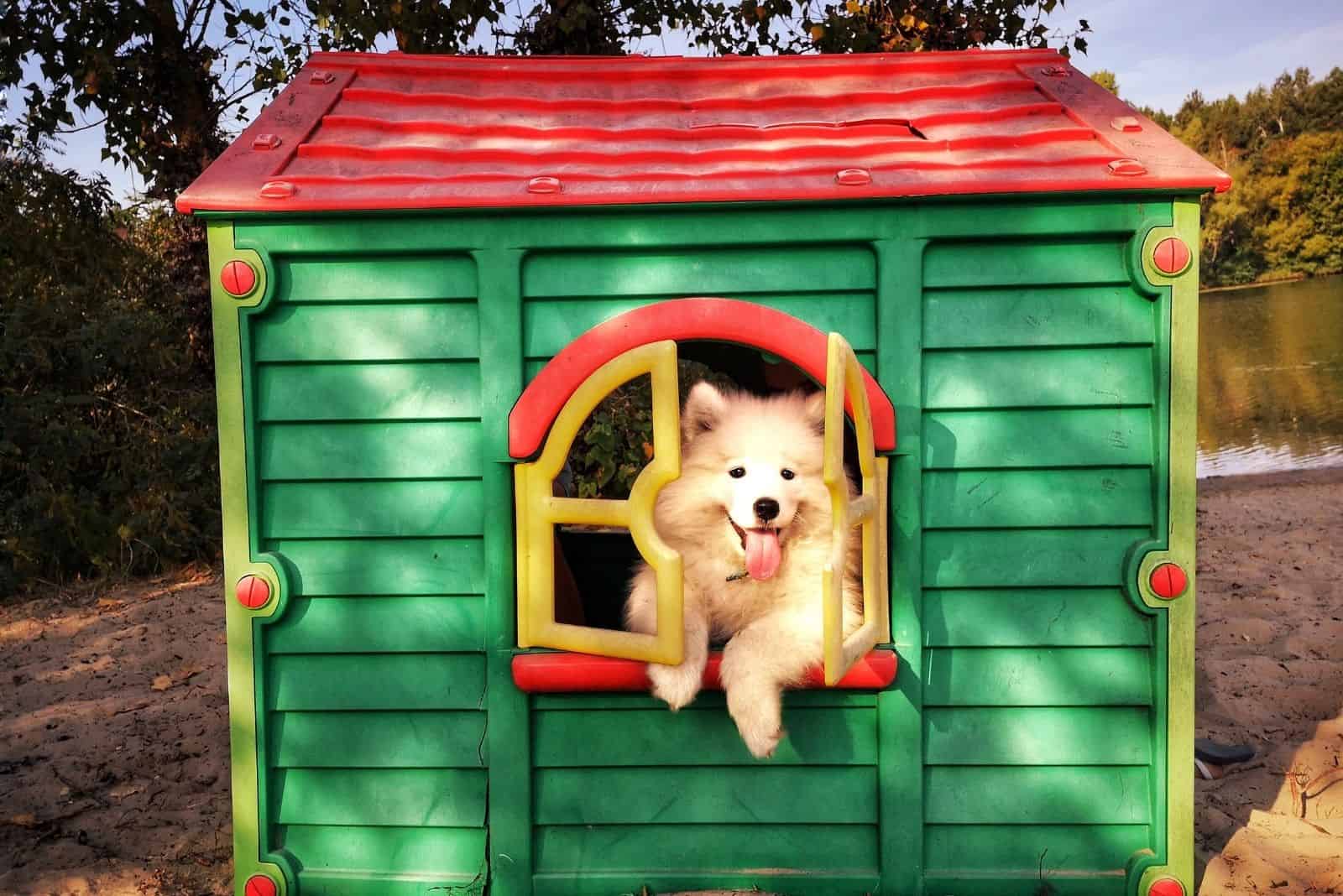
Watchdog? Yes. Guard dog? Never going to happen!
They will certainly raise the alarm when they think it necessary. In fact, they think it’s necessary most of the time.
This is a very vocal breed that loves to bark.
They’ll bark at everything that moves, so it’s a good idea to address this problem before it goes too far.
Barking is all well and good, but when it comes to confronting an intruder, they’ll run a mile… either that or they’ll try to make friends with them.
These are among the most friendly dogs on the planet, and they aren’t cut out to be guard dogs.
It may well be that the barking will be enough to deter an intruder. In this case, you might say that the dog has performed the role of a guard dog.
However, they will very rarely attack a stranger unless cornered or in extreme circumstances.
Are Samoyeds Protective?
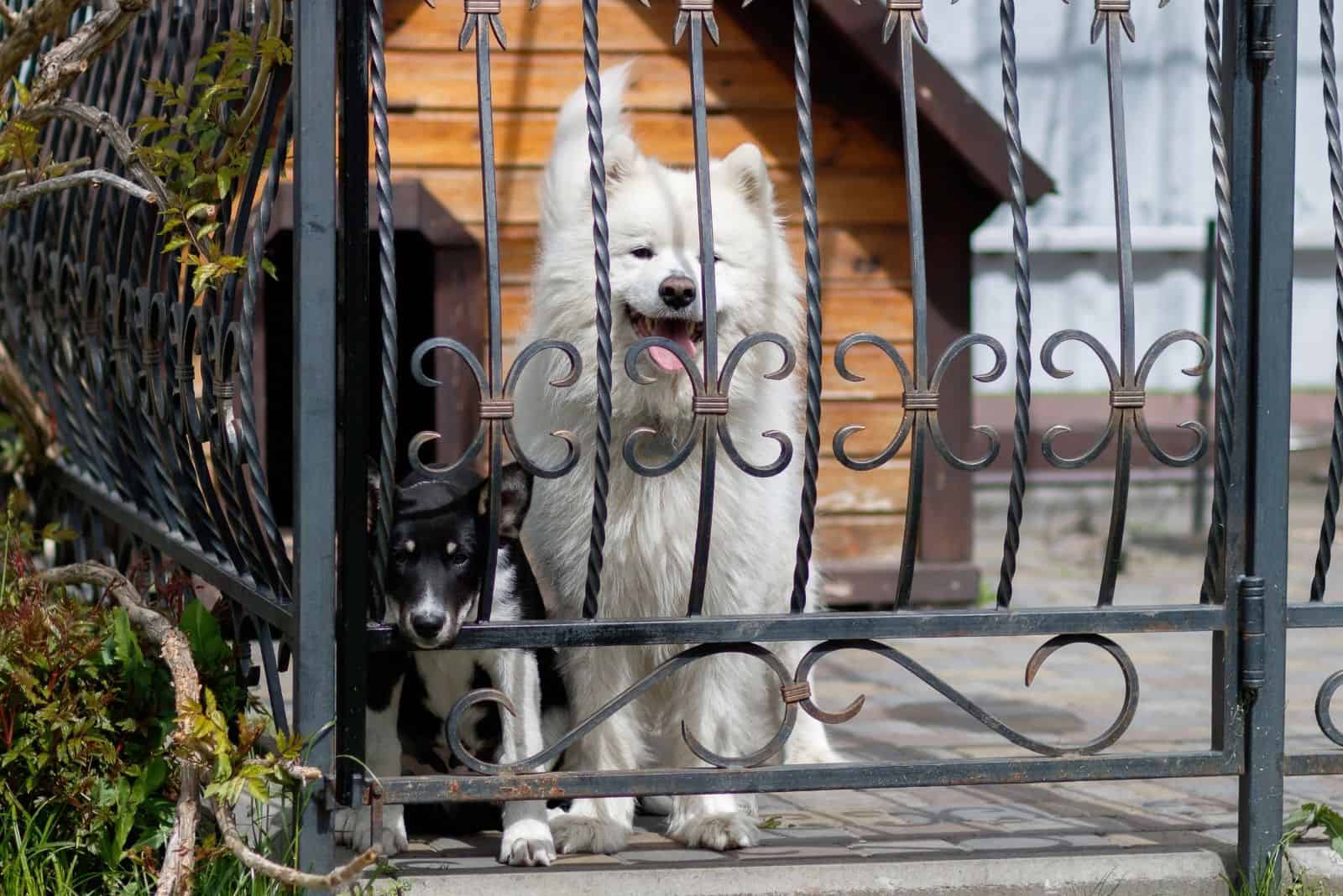
In a word, yes. They are protective of their homes and the pack. That’s not to say that they’ll take it any further, but they’ll always tell a potential intruder that they are not welcome.
As we saw in the last section, Samoyeds love to make noise. They’ll bark at anything and everything, and you’ll probably want to train them to tone it down a bit.
Being protective is one thing, but it’s all noise with the Samoyed.
Even so, stories abound online about heroic Samoyeds that refuse to back down when they believed that kids were in danger.
They may not attack, but they’ll put themselves between children and strangers and make a noise until help arrives or the danger passes.
Can Samoyeds Be Aggressive?
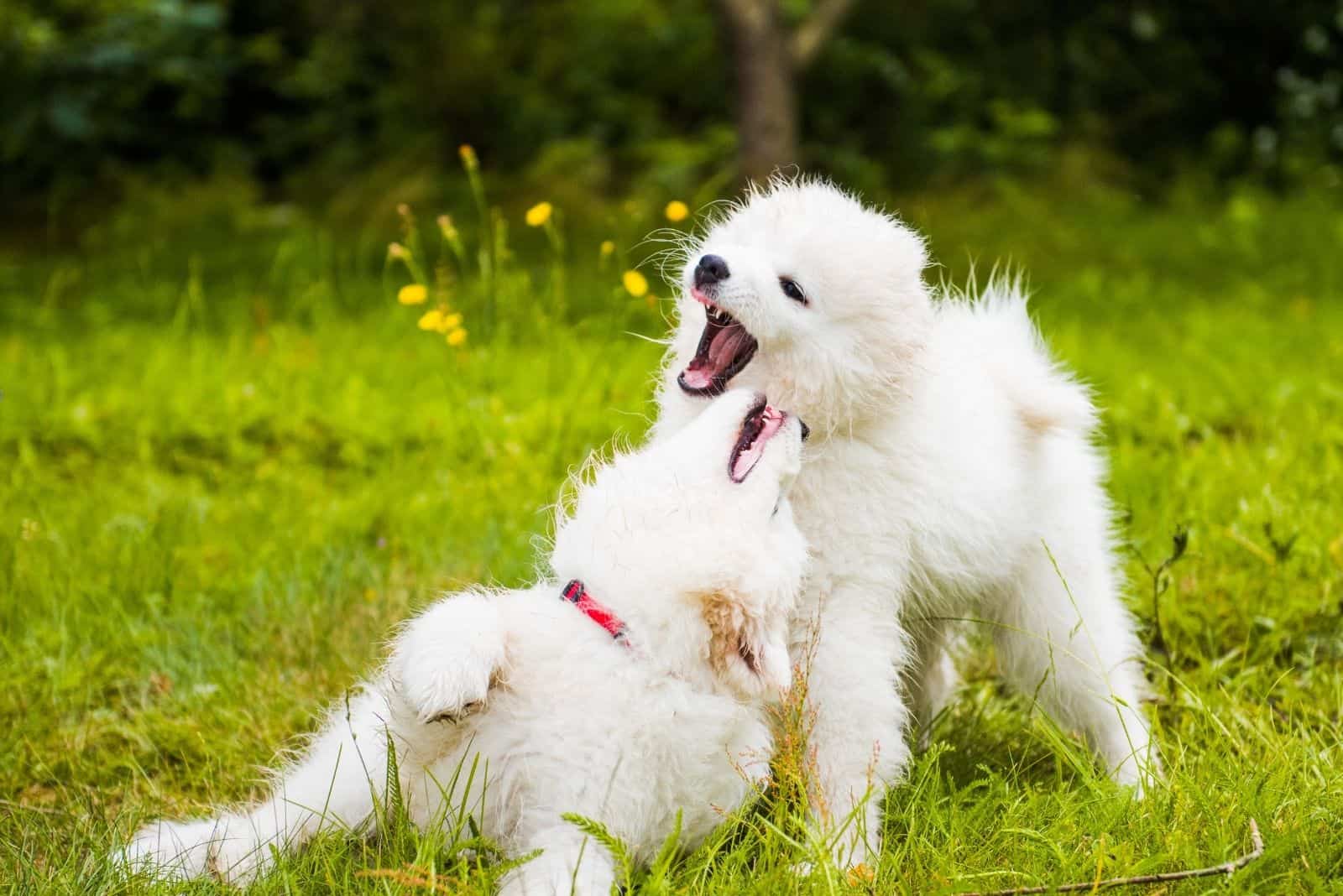
They usually aren’t, but the possibility should never be ruled out.
Some websites, such as that of the Samoyed Club of America, warn about neglected or mistreated pups that become aggressive later in life.
This stresses the importance of your role in raising and caring for the dog, as the environment will have an effect on their behavior.
Once again, we are reminded that it is often human involvement that causes behavioral problems in animals.
Other than this, it’s a matter of common sense. An injured or sick dog may be defensive. A dog that feels afraid or cornered might react in an unpredictable manner.
A dog that is driven by its hormones, whether male or female, might not take too kindly to being restrained.
There are all kinds of scenarios where a dog might feel that it needs to react with a snarl or a growl. With a Sammie, it hardly ever goes beyond this.
However, each dog is an individual with its own personality. Your best bet is to bond with your pup very early on and learn what all its quirks are. Try to understand its body language and noises.
With the right environment and care, aggression shouldn’t be something you ever have to worry about.
Final Thoughts
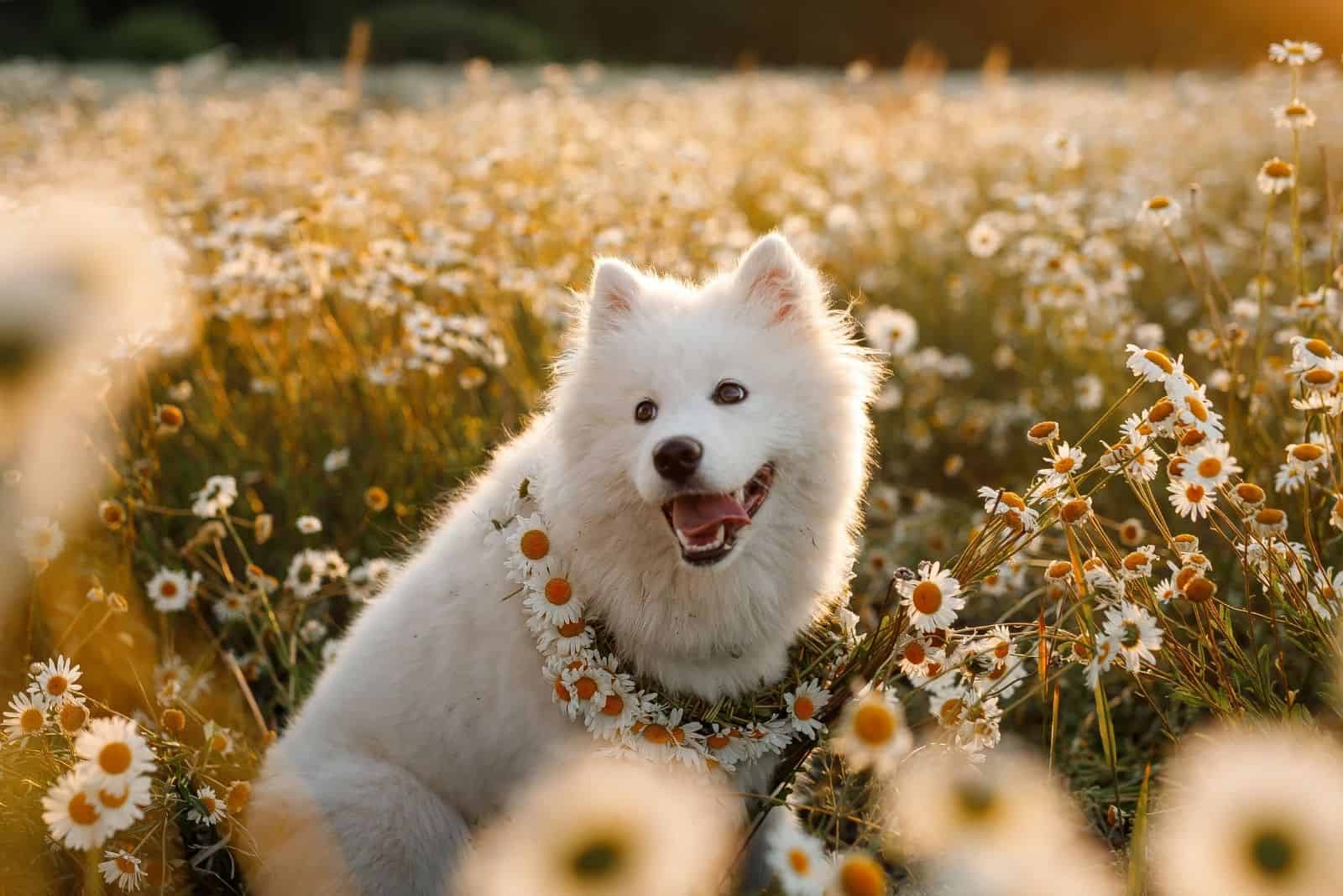
Are Samoyeds aggressive? We have looked at the evidence and it all suggests that they are the exact opposite. If anything, they can be too friendly!
These active dogs make great playmates for both the young and the old, and they will keep that bubbly, puppyish character well into old age.
That’s not to say that you’ll never see aggression. As we already pointed out, when any animal is abused or neglected, they can react badly. Also, sick and injured animals can be unpredictable.
They don’t have any other way of telling you that something is wrong, so they may snap at you. Most of us can relate to that in some way: we’ve all felt sick or in pain at some point in our lives, and may have reacted out of character.
Overall, the Samoyed is a fluffy, friendly ball of fun. They love to be loved. They just want to be with you and enjoy your company. Watch out for that mischievous streak!
They’ll encourage you to join in their fun and games, and they have a real sense of humor.
If you don’t feel inclined to join them, or if they feel that you’re neglecting them, don’t be surprised if they get your attention by knocking something over or running away with an object of yours.
All pets deserve the very best chance to thrive in a loving and nurturing environment. Samoyeds are one of the happiest, friendliest breeds going, and they make excellent family pets.
If you give them what they need, then aggression should never be a problem.

